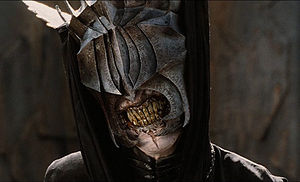Do fantasy characters need to floss?
The short answer is yes, they need to floss. That is, if they want to keep their teeth.
Real world necessities. Fantasy world necessities. Whichever. Necessities are… well, necessities.

The Mouth of Sauron photo credit: KC Sheehan via photopin cc
Watching Lord of the Rings I believe it’s no wonder the orcs are so cruel and cranky. I mean, have you noticed their teeth? Good grief, they must be in constant pain. The Mouth of Sauron was the worst. He’s the poster child for dental neglect. I could diagnosis his gum disease from the back of the theater. Evil tyrants seldom provide dental benefits. Maybe they like it that way. Between bad oral hygiene and the stench of filth, we’d all be as grouchy.
However, the wider thought for the fantasy writer is remembering the mundane in the midst of a spectacular world. Bilbo wanted his handkerchief; Jean-Luc Picard liked his Earl Grey; Mrs. Beaver saved her sewing machine from the White Witch.
Adventures are the muscle of a fantasy or sci-fi story, but depth of setting and character many times comes from everyday necessities. Let’s look at some of these ‘dull’ needs and why to use them in an imaginary place.
Food
Of course it’s more fun to describe an exotic banquet, but common folk partake of common fare. In Curious Origins of a Restless World I wrote of both for a variety of reasons. People have to eat even on a remote planet.
The boy Kadez in Story 5 “Blood Cover” resented being relegated to the role of family cook, but his skills served him well by the end. Much to his shock, he even introduced the idea of cooked meat to his capturer.
The exile Lamber in Story 8 “The Apprenticeship of Heroes” forces himself to swallow a “kind of heavily salted fish stew hovering near spoilage” in order to survive. This bit of detail makes obvious how far his life has degraded.
The lavish banquet in Story 11 “Broken Harbors” tempts Ambassador Hehpanx to desire the ease and luxury of the Vayveean royal court, especially in contrasted to the more disciplined life of his people the Chirannese. He has to confront the tug of his appetite by Story 13 “Havens.” Meanwhile, his wife is disgusted at the excess. Sometimes it’s not only the kind of food but the quantity.
Clothing
Clothes make the man… or woman. Fabric and style reveal status, personality, or change. And another thing: We don’t want our aliens running around naked.
In Story 3 “Deliverer” Sevalork each day keeps noticing Vylahysh’s clothes. This is not because he’s fashion minded, not Sevalork who stutters when he’s around women. It’s because he’s falling in love with her.
Back to Lamber in Story 8, his once well-made clothes eventually wear into rags. His next set of clothes is rough but sturdy. That becomes his life.
In Story 11 Princess Panna is distracted from nation-shattering events by decisions on which dress to wear. But her interest in luxury wanes as she’s forced to choose necessities and survival. By Story 13 she ends up wearing a wench’s gown to hide her royal status.
Shelter
A writer could spend pages elaborating on a grand palace, but most people live in more humble dwellings. Describing differing types of buildings gives the reader a connection to an imaginary society.
I describe Ehrquaun’s palace in Story 2 “Siege’s Spoil” not only to give setting but also to reveal some of Hothana’s character as she reacts to it. However, she didn’t want to be bought by a fine house.
On the other hand, Jaybek’s reluctance in Story 11 to leave his shack and farm underscores the value of home no matter how humble, especially when forced to leave it.
Aiesstaun’s tree house of Story 9 “Beautiful Desolation” is an example of his ability to thrive alone in the wilderness. Dwelling up in the trees also contrasts with the manner his people are living in slavery, that is, down on the forest floor in huts. Story 10 “Death Wind” finds him without shelter at all.
Transportation
Even winged people need ground or water transport to cart heavy cargo far distances or to show off status.
Hothana in “Siege’s Spoil” is carried to the city Kaynmo in a hanging sedan chair as a token of honor by Ehrquaun for his future queen. She’s not impressed. Contrariwise, the hanging sedan chair in Story 12 “The Tempest Sets Sail” shows how spoiled Princess Panna is.
The lowly burden carrier of Story 4 “A Farther Heritage” is a necessity for Geemoha but only until she meets Ommee as she realizes a gladiator is a more valuable asset than a pack animal.
Mantvor’s boat in Story 11 is one of his “happiest possessions.” But later, becoming the captain of his own ship only reminds him how much his life has changed. By Story 13 his mode of transport will have changed beyond what even he thought he was capable of.

Got Floss photo credit: rustytanton via photopin cc
Battle scenes and gore, romance and beauty, revenge and deceit, courage and rescues, these are what we think of in fantasy literature. But any character needs to eat, drink, sleep, and get out of the elements.
In writing, use these little details to open up your characters and imaginary cultures to your readers.
While reading, look for these little details to gain a greater insight into a book’s world.
O, and floss once a day. Use this link to my dental website if you need instructions: How to Floss in 4 Easy Steps. You don’t want to end up like the orcs. Ugh!


Yes, the little “common place” things are what really draw you into a story!
You are so right. It’s where we live day to day. Thanks Rosemary.
I think those details are what make us enjoy not just the story itself, but the actual reading of it. Good insights!
Thanks Melissa. I totally agree… obviously.